
7 Common Proverbs
7 Common Proverbs from this youtube video
Top 7 English Proverbs that You MUST Know
https://www.yo utube.com/watch?v=zn TNNZO7Jp0
Level: intermediate
Age: 7-100
Type:

A OR AN
CHOOSE AND COLPETE THE SENTENCES
Level: elementary
Age: 6-9
Type:

grammaer and vocabulary 3rd formers tunisia
Level: intermediate
Age: 17-100
Type:

Easter or Passover
A text about the pagan and religious origins of Easter and Passover followed by a discussion part. Enjoy and eat plenty of chocolate :)
Level: intermediate
Age: 12-100
Type:

Will or (be) going to?
This worksheet will allow your students to identify the difference between the use of will or (be) going to.
Level: elementary
Age: 11-100
Type:

The Sniper -Vocabulary Tracker
A vocabulary tracker list for the short story "The Sniper" with text specific quote to reference for context clues and understanding.
Level: advanced
Age: 14-100
Type:
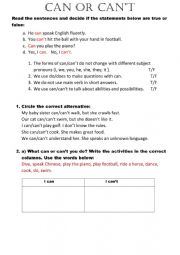
Modal verbs (can or can�t)
At the beginning of the page there is an activity where students are asked to decide if the statements on the theme are true or false and to make a conclusion about using "can/can�t". It is followed by simple exercises in which they are asked to circle the correct answer, write about themselves, to ask questions and give answers, report answers as ...
Level: elementary
Age: 9-11
Type:
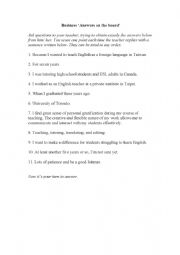
Answers on the Board
Level: intermediate
Age: 18-100
Type:

many or much
much or many use and tasks
Level: intermediate
Age: 12-15
Type:
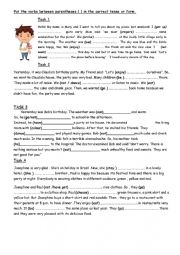
put in the right tense or form
mid term 3 language tasks for 7th grade
Level: elementary
Age: 11-14
Type:

Minimal pairs
Student have to identify what is the best word depending on the context
Level: intermediate
Age: 13-100
Type:
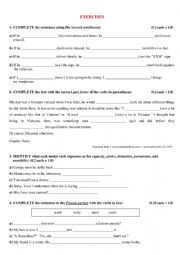
EXERCISES FOR TESTING
Past forms.
Causative verbs; will.
Conditionals.
Simple past; Present perfect; Present perfect continuous; Passive voice. Vocabulary: noun phrases; suffixes (-er) and (-or).
Relative pronouns; Relative clauses.
be + going to + verb; Direct and Reported speech.
Modal verbs.
Level: elementar
Age: 11-14
Type:
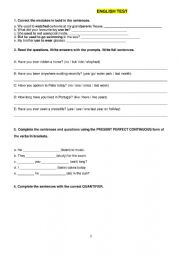
English Test
First Conditional with if and unless, might vs. will, will and be going to, future
continuous, can, could, be able to, have to, need to, must, should, can, may, might, could,
must, can�t, second conditional, Present and Past passive.
Level: intermediate
Age: 14-15
Type:

Where does he or she works?
a worksheet about jobs and occupations
Level: intermediate
Age: 13-100
Type:

mid 1st semester test n�2 or mid-term 2 test
I hope you like it
Level: elementary
Age: 12-12
Type:
|
|
|